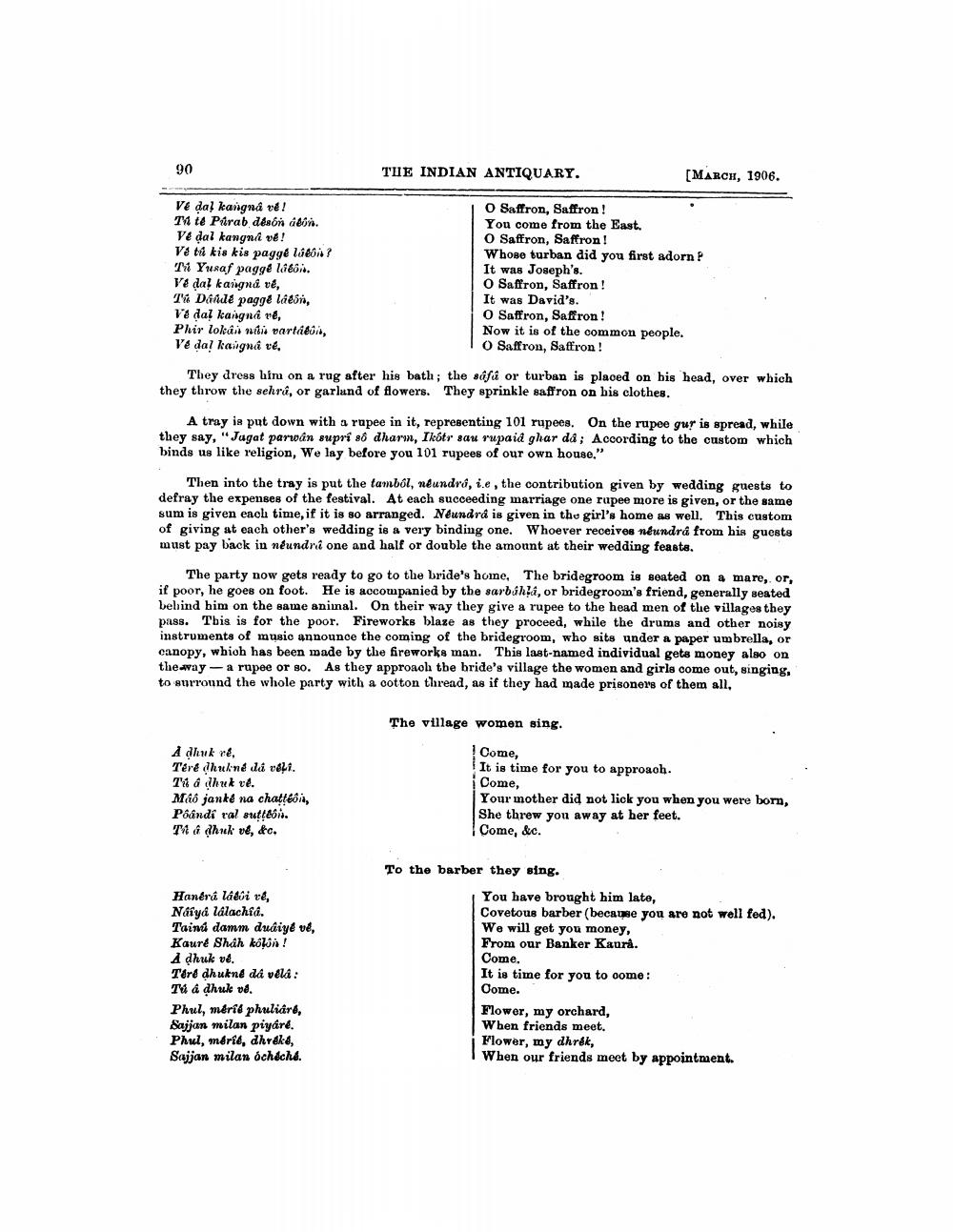________________
90
THE INDIAN ANTIQUARY.
(MARCH, 1906.
Ve dal kangna ve! TM te Pirab desón adin. Ve dal kangni ve! Vá tú kis kis paggé lábon ? Tu Yuraf pagge libois. Ve dal kangnå ve, Ta Dandé paggé laen, Ve dal kaingna re, Phir lokaii niti vartaluis, Ve da? kaigna ré.
O Saffron, Saffron ! You come from the East. O Saffron, Saffron! Whose turban did you first adorn P It was Joseph's. O Saffron, Saffron ! It was David's. O Saffron, Saffron ! Now it is of the common people. O Saffron, Saffron !
They dress him on a rug after his bath; the sáfá or turban is placed on his head, over which they throw the sehrî, or garland of flowers. They sprinkle saffron on bis clothes.
A tray in put down with a rupee in it, representing 101 rupees. On the rupee gur is spread, while they say, "Jagat parwan supri að dharm, Ikotr sau rupaid ghar da; According to the custom which binds us like religion, we lay before you 101 rupees of our own house."
Then into the tray is put the tamból, néundro, ie, the contribution given by wedding guests to defray the expenses of the festival. At each succeeding marriage one rupee more is given, or the same sum is given each time, if it is so arranged. Neundra is given in the girl's home as well. This custom of giving at each other's wedding is a very binding one. Whoever receives néundrá from his guests must pay back in neundri one and half or double the amount at their wedding feaste.
The party now gets ready to go to the bride's home. The bridegroom is seated on a mare, or, if poor, he goes on foot. He is accompanied by the sarbúna, or bridegroom's friend, generally seated behind him on the same animal. On their way they give a rupee to the head men of the villages they pass. This is for the poor. Fireworks blaze as they proceed, while the drums and other noisy instruments of music announce the coming of the bridegroom, who sits under a paper umbrella, or canopy, which has been made by the fireworks man. This last-named individual gets money also on the way - a rupee or so. As they approach the bride's village the women and girls come out, singing, to surround the whole party with a cotton thread, as if they had made prisoners of them all,
The village women sing.
A dlouk re, Téré (hukne dá véli. Tá a huk ve. Mđó janke na chatten, Paandi ral outcois. Tu á dhuk vé, &c.
Come, It is time for you to approach. Come, Your mother did not lick you when you were born, She threw you away at her feet. Come, &c.
Hanérá lábi re, Naiya lalachid. Tainu damm dudiyê ve, Kauré Shah kolun ! A dhuk vd. Térd dhukne da veli: Tú a dhuk vd. Phul, mérié phuliare, Sajjan milan piyare. Phu, merit, dhréke, Sajjan milan ochéché.
To the barber they sing.
You have brought him late, Covetous barber because you are not well fod). We will get you money, From our Banker Kaurá. Come. It is time for you to come: Oome. Flower, my orchard, When friends meet. Flower, my dhrék, When our friends meet by appointment.




